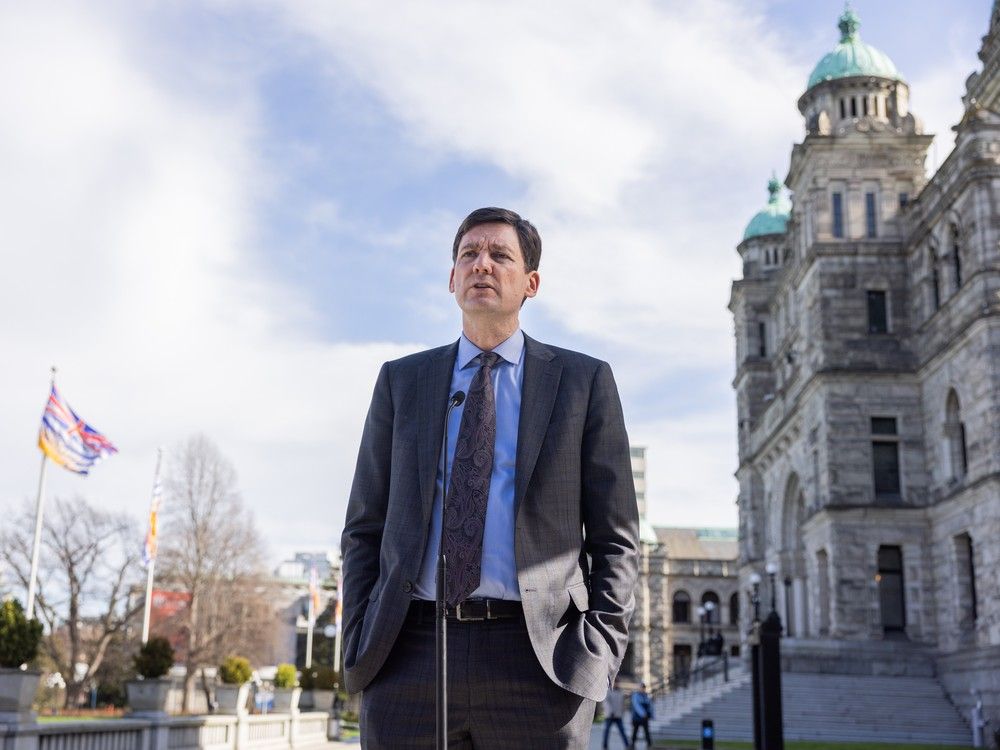
With just five days left in the legislature’s spring sitting, the NDP’s controversial infrastructure bill is finally up for debate as critics continue to voice concerns.
Bill 15, the Infrastructure Projects Act, was introduced May 1 and allows the provincial cabinet to fast-track approval of major public infrastructure projects, such as schools, hospitals, cancer centres, student housing and any other projects deemed “provincially significant,” like critical mineral mines, through an expedited environmental assessment process and easing of the permitting procedure.
It has been roundly criticized by First Nations, municipalities and environmental groups for overriding local decision-making and being introduced without proper consultation.
The First Nations Leadership council has warned the legislation contravenes the government’s own Declaration on the Rights of Indigenous Peoples Act, which it passed in 2019.
“I’ve been around provincial politics a while now. If (former B.C. Liberal premier) Christy Clark tabled this bill in 2014, we would never have heard the end of how awful it is (from the NDP),” said Adam Olsen, a lead negotiator for the Tsartlip First Nation and a former Green MLA from 2017 to 2024.
Trish Mandewo, the Union of B.C. Municipalities president, said she wants to see the government retract the bill, having heard from many local governments concerned that it will further erode their autonomy.
Though she agreed with the need to build hospitals and schools, she questioned whether it was necessary to override municipalities to do so.
“We have seen in the past that when legislation is passed with little or no consultation, it fails, generally, and when the province proceeds that way, the legislation creates as many problems as it solves,” said Mandewo.
Both Opposition parties, the Conservatives and the Greens, have voiced opposition to the legislation, leaving the government with the possibility that it will have to call on Speaker Raj Chouhan to cast the tiebreaking vote to pass it.
If a single NDP MLA isn’t present or votes against the legislation, it could fail.
Nevertheless, Premier David Eby has signalled his intention to push the legislation forward, while his House leader, Mike Farnworth, has made the bill a confidence motion, meaning the government could fall if the legislation is rejected.
Farnworth has also introduced a requirement that a final vote must be held no later than 8 p.m. on May 28. This effectively gives the House no more than four days to get through second reading, committee stage and third reading.
Infrastructure Minister Bowinn Ma told reporters Tuesday that the legislation is needed for the province to be able to support “economic development” and provide infrastructure needed by growing communities.
“We heard loud and clear in the 2024 election that British Columbians liked what we were doing, but they wanted more of it to be done,” said Ma. “We need to get the schools built. We need to get the hospitals built. We need to bring economic opportunity into communities that desperately need it. We need to meet the moment, the needs of the moment. And so we’re moving quickly, because British Columbians expect that of us.”
Conservative Leader John Rustad called the government’s actions “undemocratic” and suggested the NDP is trying to cover up their mistakes over the last eight years.
He also accused the government of giving itself the power to pick “winners and losers” when it comes to which private sector projects are deemed significant enough for accelerated permitting.
“They’ve decided to use the legislative hammer to limit how much debate time we have,” he told reporters. “They obviously do not respect this legislature. They don’t respect the elected people in this province. They don’t respect the people of this province. They think that they have all the answers and that they should just be given a blank cheque to be able to do anything.”
Olsen noted the government does have the opportunity to delay Bill 15 until the fall, allowing time for revision and consultation with First Nations and municipalities. At the same time, he said that consultation should have occurred before the legislation was introduced in the first place.
Tara Marsden, Wilp sustainability director for the Gitanyow Hereditary Chiefs, said her nation had been given only weeks to review the bill and that all the changes they proposed were rejected.
She said that Indigenous leaders around the province have had emergency meetings, but doesn’t know if there’s time to be influential.
“We shared our concerns and their response was that they will be proceeding and that they will continue to recognize our own assessment processes that we have in place,” she said. “It will be difficult to do that when they have really removed themselves, or plan to remove themselves, from their own assessment process.”